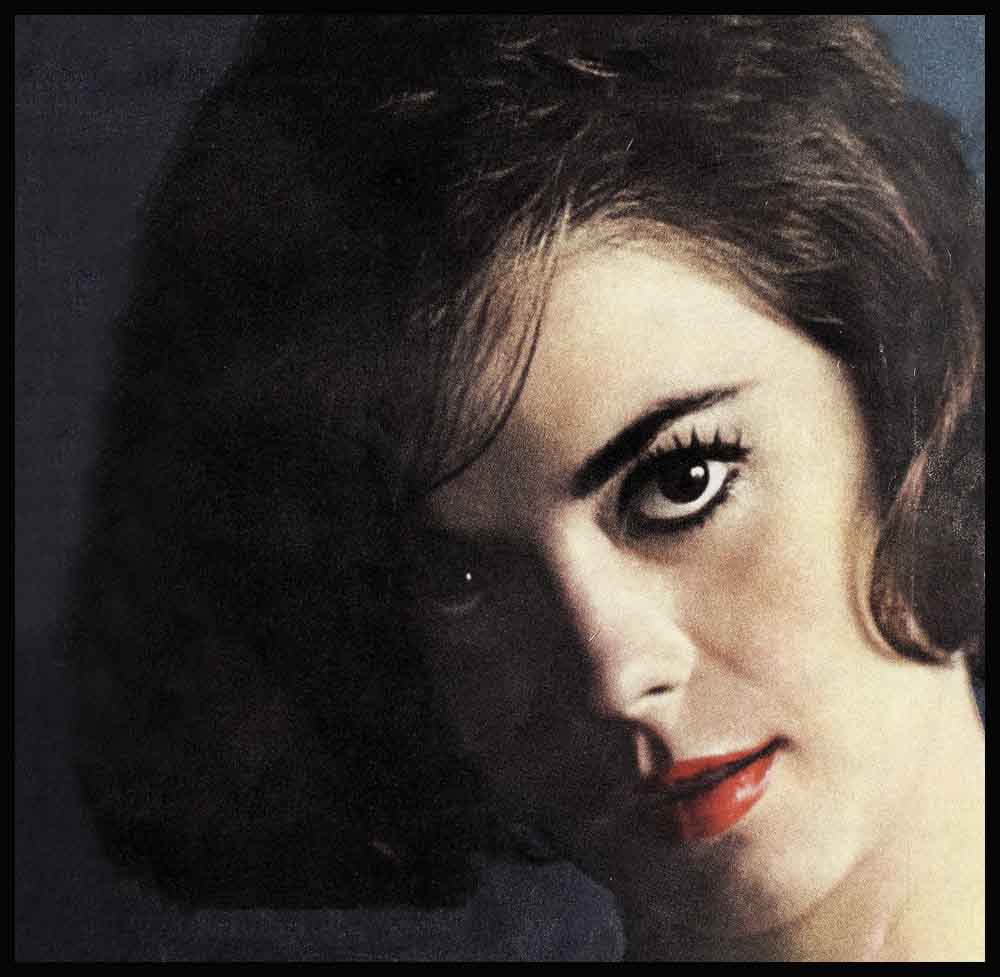
The Natalie Wood Story
Today Natalie Wood is riding the wave of success. It is a tremendous wave. She has been acclaimed for “Splendor in the Grass”—a drama; praised for “West Side Story”—a musical. She rode a success wave once before—and almost drowned.
Today Natalie is also whirling on the merry-go-round of love. Feverishly, she is reaching out for a brass ring named Warren Beatty. Only four years ago she was reaching out for Robert Wagner. She caught him, too. This past July, she decided the catch was a bad one.
AUDIO BOOK
Those who know Natalie know that what she does, on screen or off, she does with every bone in her body. For her life doesn’t just go on; for her it burns with a white hot flame. It is this very intensity that has caused her trouble. It is this very intensity that will continue to cause her trouble in the future. And that is what this story is all about.
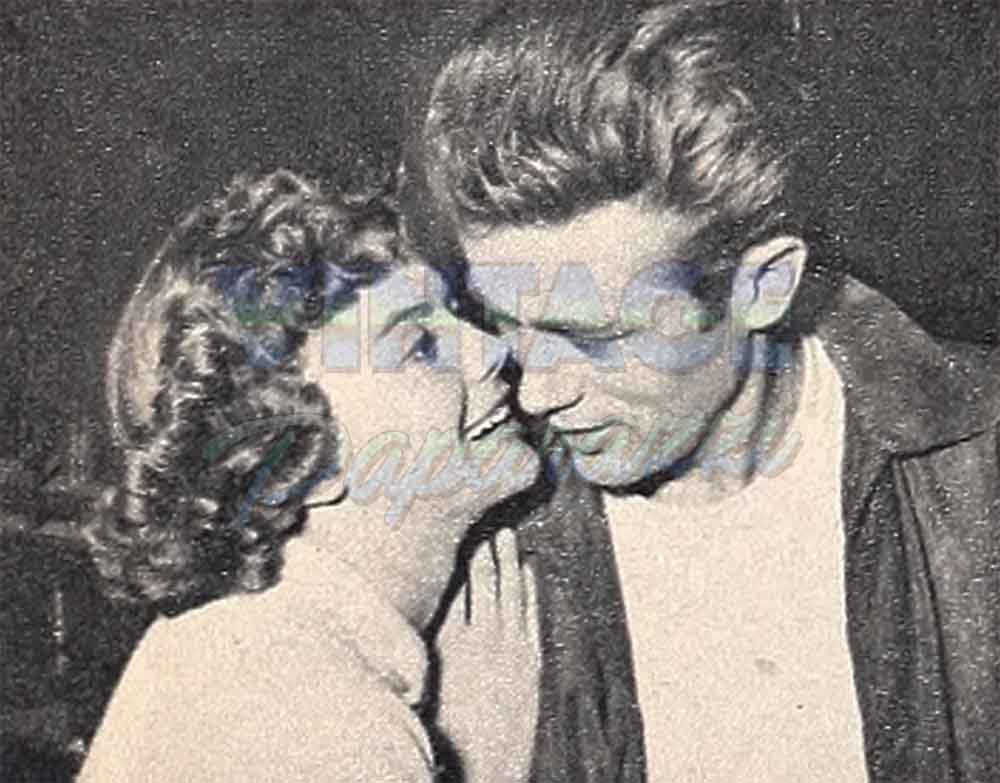
One of the most serious problems Natalie faces—a problem most of her friends feel she sought to solve by marrying Robert Wagner—is that of proving to herself that she can be all woman and all actress without having one dissipate the other.
Natalie began acting four years after her birth on July 20, 1938. The yearning to be a star has burned deeply within her since she was old enough to know what a “star” was. The fire reached white heat during her deep friendship with the late James Dean in 1954. Some say that when Dean was smashed to death in an auto accident a year later, Natalie’s longing to be “great” came to a tearful, screeching halt. In a way, it did. But because Natalie knew life would go on without Dean—just as surely as it had gone on so beautifully with him—she turned her face to the future with renewed determination.
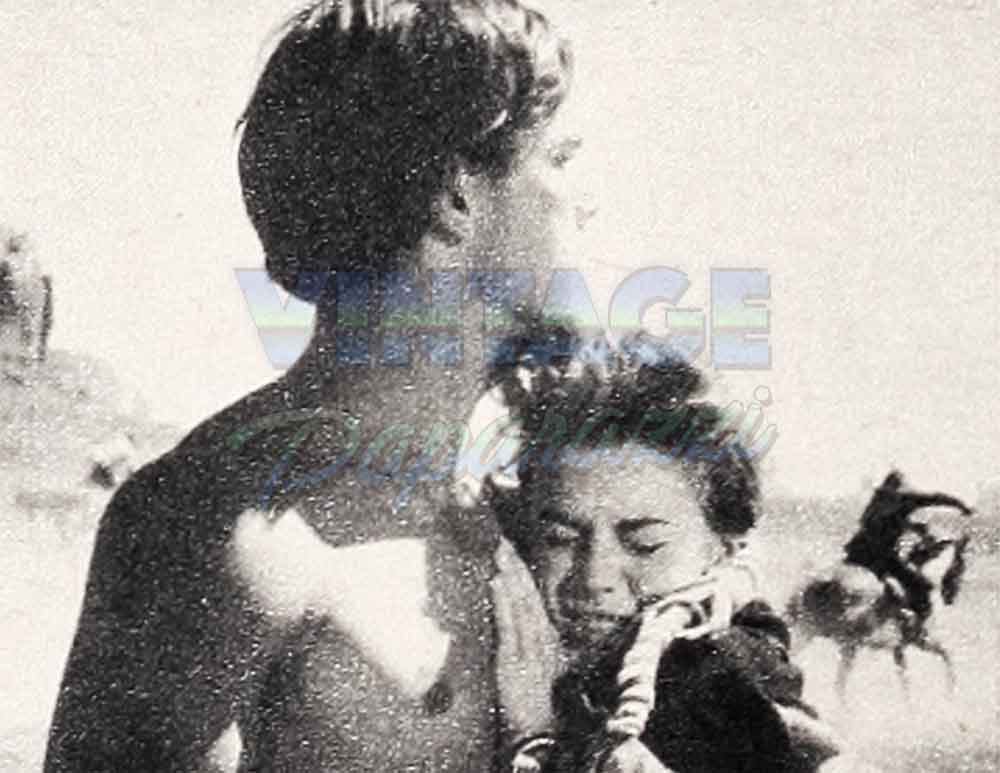
“It was the only way,” she said at the time. “You don’t grieve for a man like Jimmy. I mean, you don’t cry and carry on and dig yourself a deep emotional depression. Anyone who knew Jimmy knew that he would think the so-called period of mourning was ridiculous. What you do do is remember him. All the funny, crazy things he used to do. And you pocket part of the memory somewhere in a warm corner of your mind and let it be there forever. The other part you tuck away in your heart in the place reserved for all the men you have loved in your life. I think other women will know what I mean.”
Natalie apparently learned a great deal about the heart and mind from Dean. And what she learned she used to the utmost. She went back to work on her career with a renovated and deeply intensified fervor.
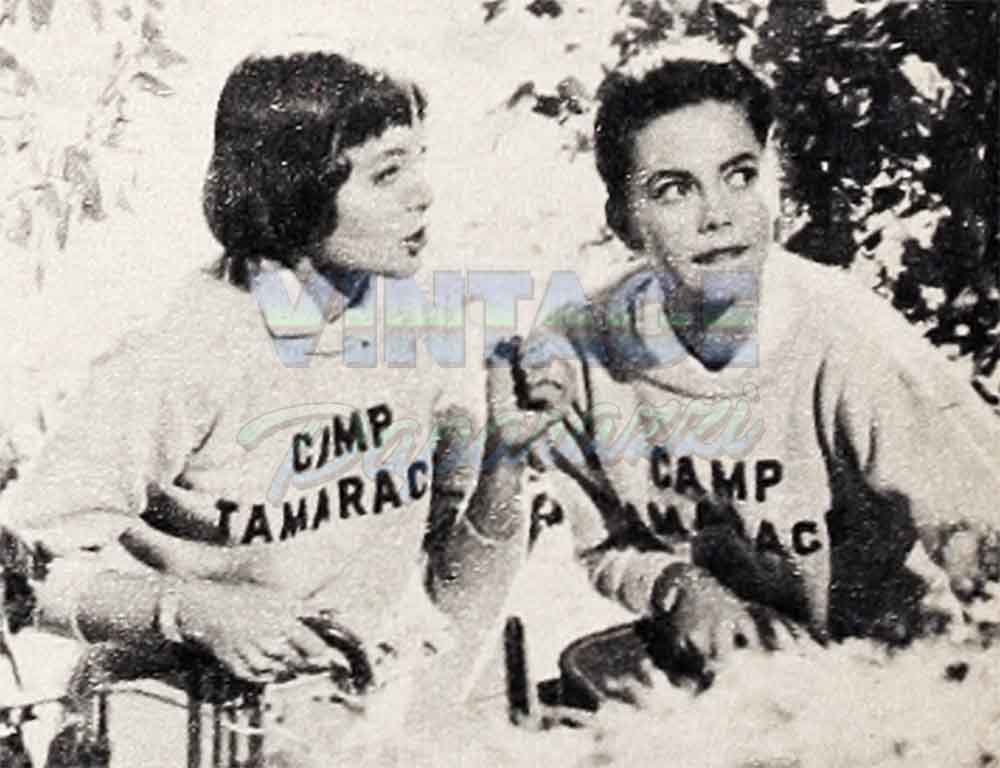
The Academy Award nomination she received in 1955 for her performance opposite Dean in “Rebel Without a Cause” prompted many a producer and studio to make attractive offers. She turned them all down for a contract with Warners. They gave her a good role in a fine Western, “The Searchers.” Contract or no, Natalie made it clear that she wanted nothing to do with quickie, run-of-the-mill movies. She wanted a very special part—a part that would be difficult, one that would tax her talent, drain her dry of emotion and force her to work harder than she had ever worked before in any of her pictures.

Aside from the boost it gave her professionally, “Rebel Without a Cause” did something else for Natalie—it made her one of the few actresses who was able to bridge the gap successfully from lovable moppet to leading lady.
In private life Natalie blossomed, too. Men camped on her doorstep. But because she had her sights set on stardom, she refused to get involved—seriously involved—romantically. She didn’t ignore men, she was too much of a woman for that—but she didn’t date any one man too long. Her parade of escorts ran the gamut from Scott Marlowe and Elvis Presley to Raymond Burr and Clan leader Frank Sinatra.

The enchantment she held for so many men confused and mystified the women of Hollywood. It is true, there are hundreds of women there who are more beautiful and more voluptuous than Natalie—but they never had the long list of escorts that she did. Never.
The answer is simple. To begin with, a picture of Natalie rarely does her justice. Her petite five-foot-two, one-hundred-pound body is perfectly proportioned. She has small, high breasts, good legs and a nice stride. She moves gracefully and turns her head with her chin up. Her large, dark eyes are always alive and flaming with whatever mood is present. Her mouth, though thin-lipped, takes on an unusual sensuousness when she smiles. Her complexion is smooth and occasionally dotted with freckles. Her face, with its hint of high cheekbones, is framed with long, shiny brown hair. This is what the camera shows—but no camera can catch that trait of Natalie’s that makes her fairly zing—her personality. Her mind is as sharp as a scalpel. She is quick-thinking, articulate, direct and uncompromising in conversation. She can be flip, funny, serious and serene. She can be child-like or a sophisticated woman.
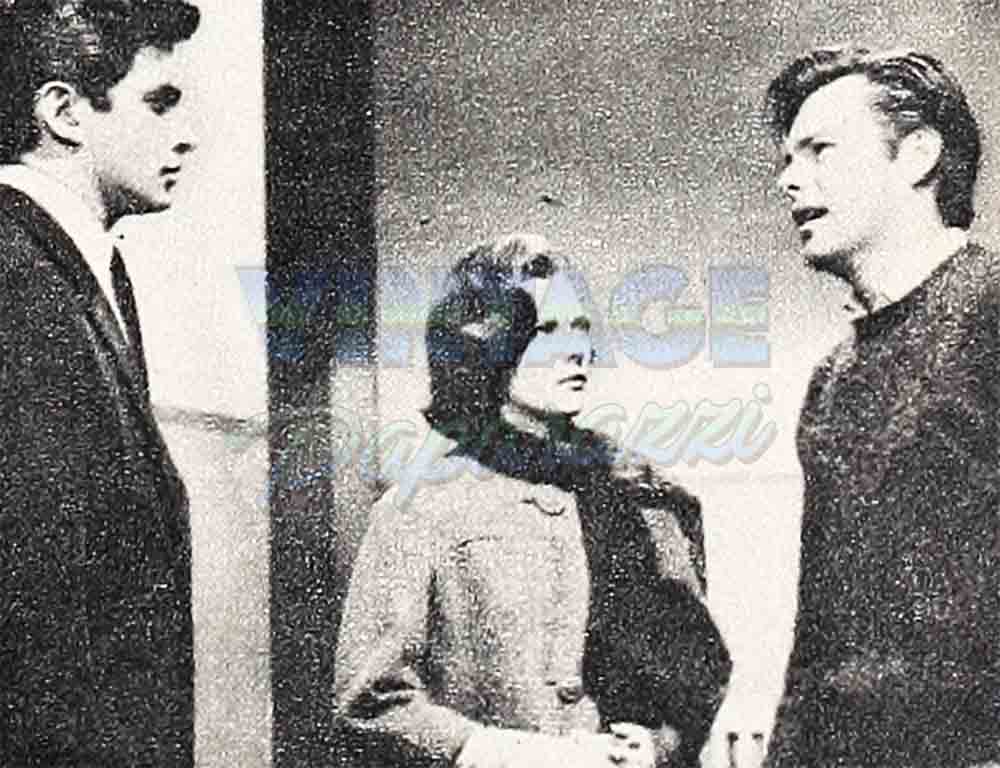
She adores men and, like most women who do, has few women friends. She is a meticulous dresser, keeps abreast of fashion, but frequently modifies it to suit her size and fancy.
“I envy her,” says one actress with a sigh, “she looks beautiful in everything.”
In addition to all of this, Natalie has never suffered a weight problem. She has a lively appetite, eats anything she wants when she wants it. When she is bored. she goes on a wild shopping spree—buying everything in sight. “No one can knock a budget in the head like I can,” she once said with unconcealed pride.
These then are the traits that make up Natalie Wood—and these just happen to be traits men adore in women.
In 1956, the men were after Natalie—but Natalie was after something else—the one role that would give her stardom.
That same year, Warners bought Herman Wouk’s best-selling novel, “Marjorie Morningstar.” Here at last was the role Natalie had been waiting for. She went after it with every ounce of her slim frame vibrating at triple time in high gear. Nothing would satisfy her but to have a personal interview with author Wouk. It was finally arranged.
BW: HER FIRST CHANCE FOR LOVE
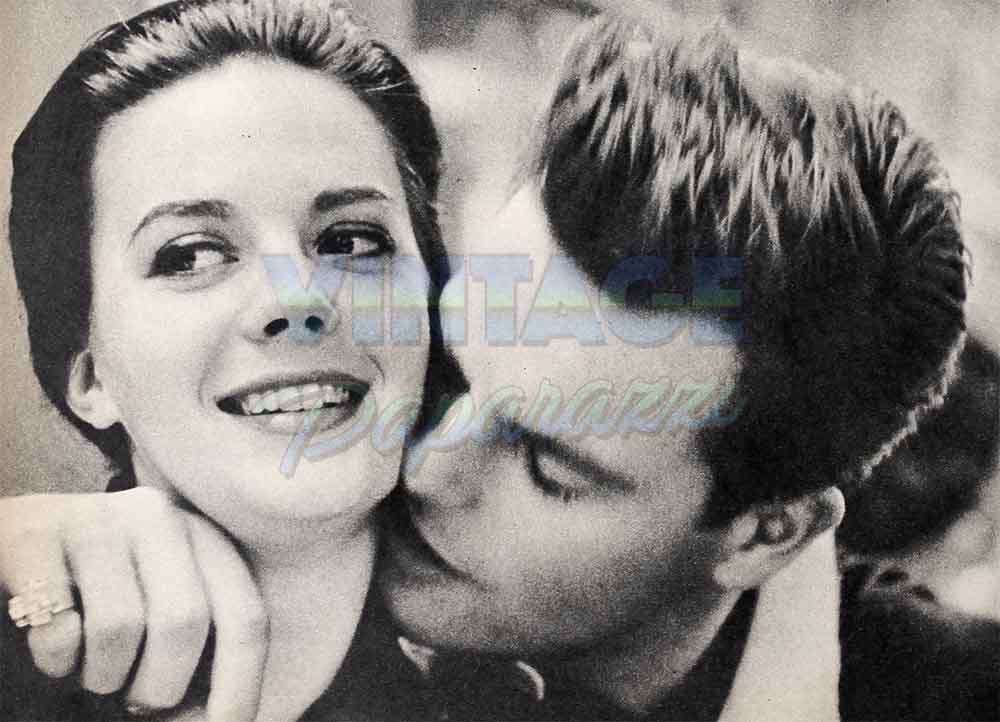
She flew from Hollywood to New York where she, her agent and Wouk had lunch at the posh 21 Club. It didn’t turn out at all as she had hoped.
“She was a beautiful, pert youngster,” Wouk recalls. “Tanned and fresh looking. Her dark eyes were lively and remarkably penetrating. It was obvious to me, almost from the moment I saw her, that she was wrong for the part. . . . About an hour after the lunch, I phoned Miss Wood’s agent and said she was out of the question as Marjorie.”
WB: HER LAST CHANCE FOR LOVE

Mr. Wouk knew his Marjorie—but he didn’t know Natalie.
For one entire year, three hundred and sixty-five thinking, scheming, angle-juggling days, Natalie thought, worked and prepared for Marjorie. Through phone calls, inside Information, private conversations and unrelenting queries, she followed the Morningstar merry-go-round. Literally hundreds of actresses were tested for the role. Their failures were Natalie’s hope. Then, after driving the producer, Milton Sperling, half out of his mind with pleas for another test, Natalie was given a second chance.
Since no one except Natalie took the test seriously, it was a haphazard affair. The lighting pointed in all directions, the scenery was shoved together like moving day, in some part of the test the cameras didn’t even follow Natalie.
But according to Wouk, “She was absolutely electrifying.” She got the part.
In theory, then, Natalie, with hard work and an ambition that refused to recognize defeat, had made it.
“It’s sure stardom, honey,” they told her. “You can’t miss.”
Natalie worked on the film, harder than she had ever worked before. She lived, ate and slept the role of the timid, insecure, drably pretty little Jewish girl who yearned to be an actress, but found only an unhappy love affair and ended up marrying a gentlemanly, predictable guy and leading the everyday life of a wife.
Off screen, things were happening to Natalie, too. She had met a gentlemanly, predictable young actor named Robert J. Wagner. She met him and decided she wanted him. Now, with stardom within her grasp, Natalie reached for something else. She reached for love. And on December 28, 1957, she married Bob Wagner. Married him as soon as she finished “Marjorie Morningstar”—but before it was released.
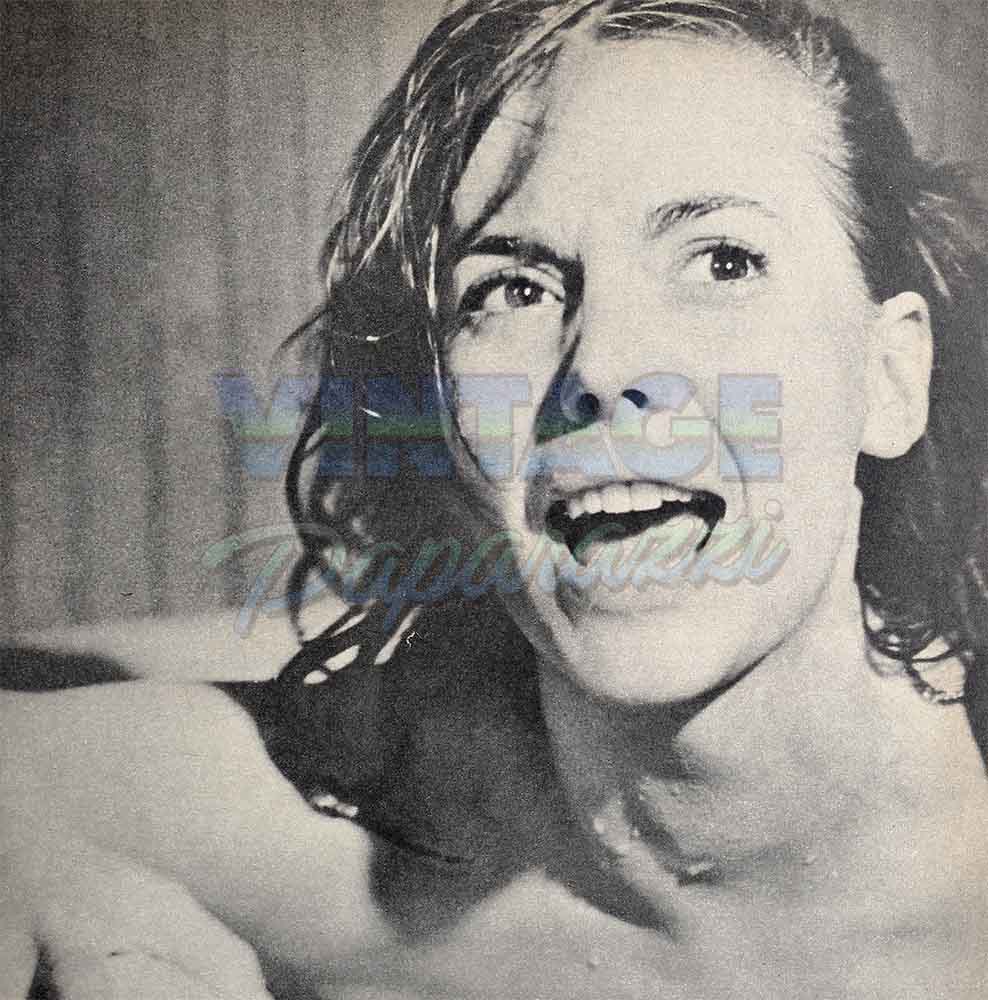
Natalie and the movie were touted, promoted and trumpeted with publicity. There wasn’t a nook or cranny in the U.S.A. that was overlooked. But the picture landed flat on its “Morningstern.” It never came close to realizing the hopes she held for it.
The apathy with which the picture was received by the critics and the public was a wet blanket smothering Natalie’s chance for stardom. She had slaved for a great triumph and was rewarded with failure.
But Natalie had something to cushion the tremendous disappointment. She had a husband who adored her—she had Bob Wagner.
Natalie and Bob withdrew from public to lead what is usually called a life of wedded bliss. Obscurity, with all the overtones of professional rigor mortis, set in. It seemed as if no one wanted to take a chance again with Natalie—on anything big, that is. And it seemed as if she couldn’t care less. The Wagners banned magazine publicity for the most part, pleading that they didn’t want to go “the Debbie and Eddie publicity route”—a fanfare Street which they were convinced would upset their marriage.
For more than a year they lived happily between a small house and Bob’s boat at Balboa. The consensus, even among the experts, was that Natalie would, most certainly, do a movie “once in a while.” But her spectacular first chance for stardom had fizzled so conclusively, no serious attention was paid to her old dream. And the films she made during this period, “Cash McCall” and “Kings Go Forth,” kept the dream dead.
Bob’s career, it should be noted, had slumped badly, too. And to top it off, a movie he made with Natalie, “all the Fine Young Cannibals,” was eaten alive by the critics. It was probably the worst failure for each. It was indeed unfortunate they shared it.

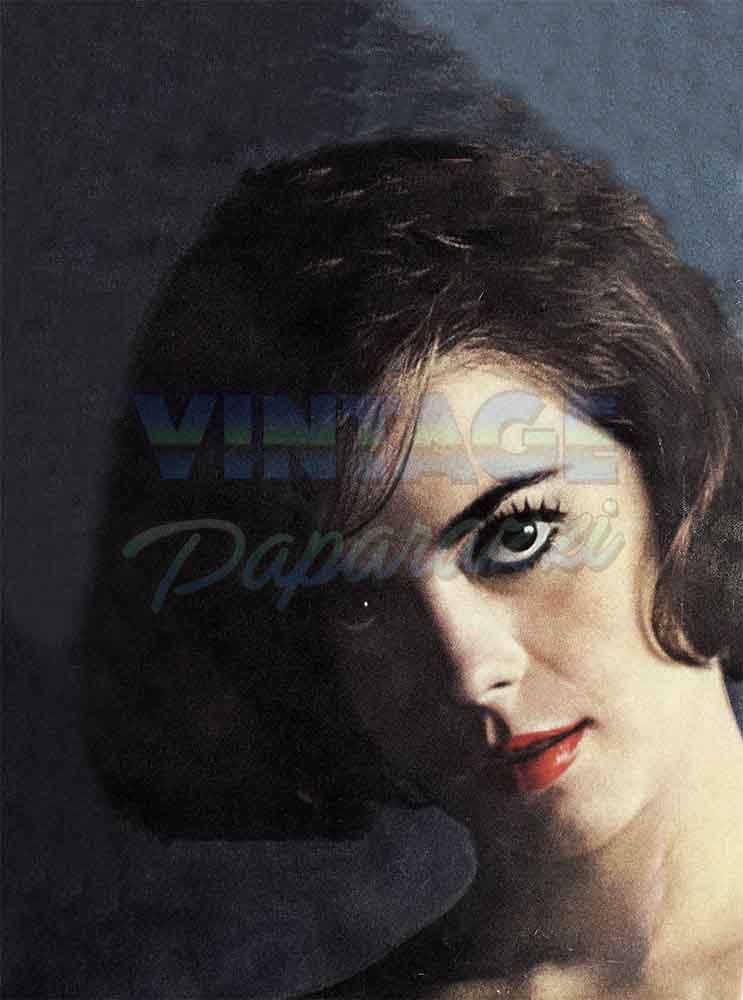
During the third year of her marriage, and with a curious but determined drive, Bob and Nat began to plan and build a home so sumptuous and grand that it “would startle Hollywood.”
“If Nat can’t have a spectacular career she is, at least, going to have one hell of a spectacular home,” a friend commented. And away went Mr. and Mrs. Wagner to erect a new dream, a house where they would live forever in opulent togetherness.
Some insiders insist that the only thing their dream palace did for them was to break them up. Both Nat and Bob deny it. But there seems to be some significance in the fact that their marriage was finished before the house.
In the spring of 1960, while Bob and Nat were dollar-deep in their dream house, Elia Kazan, one of the country’s top directors, chose her as the lead in “Splendor in the Grass.”
And on that one the Fates had another ace up their sleeve for Natalie. For just as surely as “Splendor in the Grass” gave Natalie her second chance for stardom, it gave her her last chance for love.
Her co-star in the film was an unknown but promising young newcomer named Warren Beatty. No one knew much about p him except that he was Shirley MacLaine’s brother (a fact he was reluctant to admit), and that he was romancing the somewhat older British actress, lovely Joan Collins.
When he and Natalie were in New York making the film (Wagner and Joan were there most of the time, too) rumors began that Warren and Mrs. Wagner were more than co-stars. The foursome decided to put an end to the rumors once and for all—they got together for a friendly evening. The rumors subsided—but they didn’t die.
When “Splendor” was finished. Warren went to London for his second film. Joan (who was constantly being put on suspension by her studio because she preferred to be with Beatty rather than on a sound stage furthering her career) went, too. They were reported to be engaged.
The Wagners returned to Hollywood and their dream house. But Natalie didn’t stay idle long—she went after—and got—the lead in the movie version of Broadway’s most heralded musical, “West Side Story.” Natalie, who had never sung or danced before, was to play Maria, and at a stupendous salary.
She put her heart and soul in the role. For months she practiced, practiced, practiced the dance routines. When she came down with a serious throat infection, it was hinted she’d danced her health away. And through it all, there were the rumors that all was not happy in that dream house. Of course, the rumors were denied. Then, in July, 1961—just as the word got out that Natalie was sensational in “Splendor,” terrific in “West Side Story” and would surely be a star when they were released to the public—the Wagners were separated.
Even before a community property settlement was signed, the rumors about Natalie and Warren Beatty cropped up again. This time they were so thick and fast they clogged the columnists’ typewriters. Despite frantic efforts by her press agent to put the hush on, it was soon all over Hollywood that Natalie and Warren were the hottest thing since pizza. From London, where she had finally accepted a film role, Joan Collins announced that her engagement to Beatty was broken. (Joan is now dating Bob Wagner in London!!!)
When the community property settlement was signed last August, it was hinted that Natalie would fly to Mexico, divorce Wagner and marry Beatty. She didn’t.
In September, when Warren had to go to Florida for “All Fall Down,” Natalie threw convention to the winds and flew down to Florida to be with him. It was reported that when he finished his work there, they flew to one of the nearby balmy Bahama islands for a weekend. In October, they both showed up in New York City.
Remember, when Natalie wants something, she goes after it tooth and nail—and she gets what she wants. There is no doubt that Natalie wants Warren.
“Sure Natalie’s wild about Warren,” said one of her friends. “But it’s not quite what you think. You see, it’s true that she is burning with the desire to become a great, really great actress. Now you cannot have a fire like this going inside you without having it affect your personal life. No one knows this better than Nat. And I think the thing that frightens her most is that she is now so dedicated to that goal that she will miss all the joys of being a woman. The only thing I fear for her is that his love might not be as permanent as hers.”
Which brings us to the very ungentlemanly question: Is Warren as much in love with Natalie as she is with him? We wonder.
Despite his boyish innocence at twenty-four, he is no baby when it comes to beautiful women.
“I’m too old to date like the high-school kids and I’m much too young to get married,” he said recently—though he was supposed to be engaged to Joan Collins.
It is that “in between” behavior of his that has half the beautiful young hearts in Hollywood quietly screaming for more of the same.
“Mr. Beatty,” says one of his tearful, tossed-away toys, “is interested in only one thing. Oh, he likes to dabble with a girl’s intellect and he is quite put out if she doesn’t have a bit of a brain—but believe me, his hobby is sex. Falling in love with him is like submitting to a Chinese torture. The competition was too much. But the thing that burns me is—what has Natalie got that I haven’t?”
It’s no secret that Natalie’s competition, too, is formidable. Jane Fonda has not hidden the fact that she thinks Beatty is the “sexiest” and that she is eager to see him again. Another actress, now engaged to a wealthy young man. would reportedly give up every shiny dime in return for a moody, broody Beatty.
One of Warren’s buddies claims that “four out of six phone calls he gets at home or at the studio are from women trying to get next to him. And he loves ’em all.”
All of this Beatty flora and fauna adds up to a frightening assignment for any girl—especially Natalie Wood.
For we know what Natalie—and all Hollywood—knows:
A beautiful, ambitious movie star gets two chances at love—her first and her last. Bob Wagner was Natalie’s first chance for love. Warren Beatty is her last.
A simple history of movie marriages reveals that if successful women of glamour do not find true love by their second marriage, they seldom find it at all.
Rita Hayworth, Marilyn Monroe, Ava Gardner, Barbara Stanwyck, Bette Davis—they are only a few who yearned desperately to find men to match their hearts. And after two or more marriages—they’re still looking.
One Beverly Hills psychiatrist has watched Natalie’s growth with an interest that is as much personal as it is clinical.
“Miss Wood seems to be an interesting example of twin personalities,” the doctor pointed out. “Her struggle, obviously, is between her heart and her mind. The battle is common in career women.
“Her heart is Miss Wood the woman; her intellect, Miss Wood the actress.
“But rarely have I seen the two sides so evenly balanced. It is this very equality between the two sides that can cause problems. Most women in this situation suddenly discover that their yearning for the love of a man is stronger than any intellectual drive they may experience. At that moment a woman knows what she wants most, so she quietly subordinates the weaker side of herself to the strength.
“But with Miss Wood I believe it is, literally, a case of touch and go.
“It would seem that this is because she has. despite her young years, a long and important background as an actress. She began her career at the age of four. This is precisely the age when most little girls deal only with the problems of being little girls. Miss Wood was faced with the necessity of dealing with both.
“Her experiences as a young girl, there-fore, are no stronger than her experiences as an actress. Now, as a mature woman—the results of growing as a girl—she must deal with the fine young actress, the result of a career that was potently formative.
“I can not predict which side of her will win in the end. I do not think she can, either.”
It is evident then that Natalie’s great admiration for Dean was the first “go” experience she had. In Jimmy, she saw his greatness in the acclaim he was given as an actor and felt his greatness in the deep, personal relationship she had with him. Strangely, Warren Beatty bears a striking resemblance to Jimmy Dean—so much so, that some of Natalie’s friends are wondering if, in Warren, she’s trying to recapture the past.
With Robert Wagner, Natalie experienced the first “touch” of simple womanhood. She married her lover. As Mrs. Wagner she was the young matron, responsible for keeping her husband happy, making a home for him and obligated by vows of the marriage ceremony to keep her career secondary to her husband’s welfare.
And then she was caught up in her career again. And with the new career came Warren Beatty, just as Robert Wagner had come along when she was near the goal she longed for.
Will Warren be the one to make Natalie realize that, because she does everything so intensely, she can not be all actress and all woman at the same time? Will he be the one to get her to make a decision—and stick to it?
For Natalie’s sake, we hope he does. And hope her choice spells love and happiness—first—last—and always.
—TONY WALL
Natalie is in “Splendor in the Grass,” Warners, and U.A.’s “West Side Story.”
It is a quote. PHOTOPLAY MAGAZINE JANUARY 1962
AUDIO BOOK




